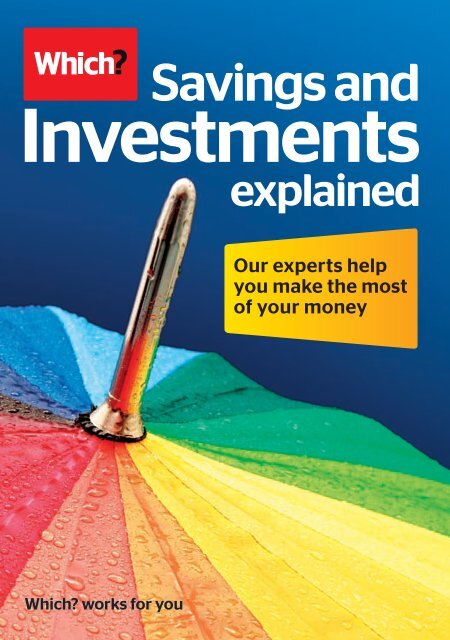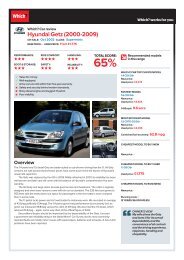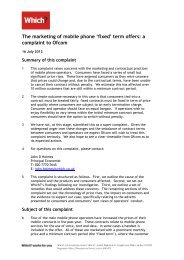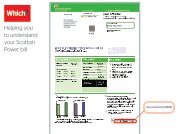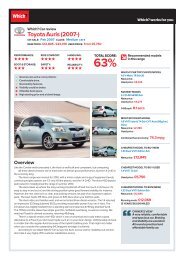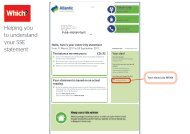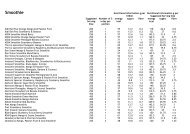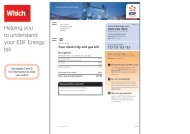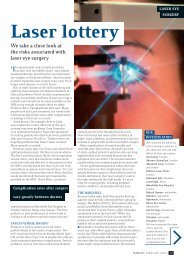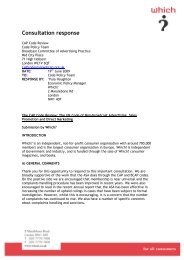Savings and Investments - Magazine
Savings and Investments - Magazine
Savings and Investments - Magazine
- No tags were found...
You also want an ePaper? Increase the reach of your titles
YUMPU automatically turns print PDFs into web optimized ePapers that Google loves.
Contents 03Inside04 Making the most of your savingsHow to get the best out of your savings account<strong>and</strong> make sure your money is working hard06 Be preparedBefore deciding where to save <strong>and</strong> invest, it’simportant to have a sound financial base tostart out from10 Getting to grips with investingWhen it comes to investing, never put all youreggs in one basket12 Underst<strong>and</strong>ing your options: buyingthe right investment <strong>and</strong> tracker fundsInvestment funds pool your money withthat of other investors <strong>and</strong> are an affordableway of spreading risk16 Make the stock market work for youIf you’re keen to go it alone, we show you howto deal directly on the stock market18 Getting a return from propertyProperty can be good for income <strong>and</strong> growth,but don’t overlook the risks20 Pay less tax <strong>and</strong> save moneyTax allowances can give your savings <strong>and</strong>investment returns a big boost21 How to find good financial adviceUnless you’re a confident investor, it makessense to get independent financial advicebefore taking the plunge22 Jargon busterDon’t be baffled by savings <strong>and</strong> investmentsjargon – we put it into plain Englishwww.which.co.uk
04Are you saving enough?Making themost ofyoursavingsHow to get thebest out of yoursavings account<strong>and</strong> make sureyour money isworking hardAt least10%of your interest is going intax, so it’s worth investingin a best-rate ISA to get agood return
Are you saving enough? 05Interest rates stuck at rock-bottom levels since2009 have left many savers struggling to find goodrates. But there are still options – from cash Isas toeasy- access savings accounts – to help get thebest return on money you don’t want to risk.<strong>Savings</strong> accounts offered by banks <strong>and</strong> buildingsocieties are low risk <strong>and</strong> give quick access at shortnotice. They’re also a good idea if you’re saving fora short-term goal of five years or less.Best ratesEven when interest rates are low, there’ll always besome savings accounts that are better than others.By regularly reviewing your savings <strong>and</strong> ensuringthey’re in the right account with the best rate, youcan make sure you’re earning the highest returns.Various savings accounts suit different needs:Instant/easy-access accounts These let youwithdraw money at any time without penalty,though there may be general restrictions, such as adaily limit on withdrawals through cash machines.Notice accounts These require you to tell yourbank or building society in advance if you want tomake a withdrawal. Notice periods of 30, 60 or 90days are common. Traditionally, these accountspaid higher interest in return for tying up yourmoney. However, today you can often get betterrates with easy-access accounts.Regular savings accounts With these youhave to deposit money on a regular basis, usuallymonthly. There can be catches, though, <strong>and</strong>, whilethey often have eye-catching interest rates, theymay be for a set period only. To stop you earningtoo much interest in that time, the banks may alsocap the amount you can pay in – often at around£250 a month.Fixed-rate accounts With most savingsaccounts, interest rates are variable. Theseaccounts, however, offer a fixed interest rate, oftenattractively high, but you must tie your money upfor a set period of time, such as one or two years.In return, you get a guaranteed interest rate <strong>and</strong>are protected if interest rates start falling. Bear inmind that you won’t benefit if rates start going up.Index linked National <strong>Savings</strong> & <strong>Investments</strong>(NS&I) <strong>and</strong> a few banks offer rates linked toinflation – for example, inflation plus 0.5% – if youtie up your money for a set period. The return fromthe NS&I index-linked product is tax free.Safe savingsThe Financial Services Compensation Schemerefunds up to £85,000 (including any accruedinterest). To be safe, ensure you invest nomore than this amount with each authorisedprovider. There is no upper limit on protectionfor National <strong>Savings</strong> & <strong>Investments</strong>.Premium bondsEach £1 you invest (minimum £100) buys one bond.Instead of earning interest, your bonds take part ina monthly draw for prizes from £50 to £1 million.Prizes are tax free <strong>and</strong> you can get your originalcapital back at any time.In May 2012, the prize fund was equivalent tointerest of 1.5% a year. This rate is variable. Onebond had a 1 in 24,000 chance of winning a prizeeach month, a 1 in 42 billion chance of the jackpot.Cash IsasIf you’re a taxpayer, it makes sense to use yourtax-free Isa allowance before putting money intoa savings account. In the 2012-13 tax year, you canput up to £5,640 into a cash Isa.With an ordinary savings account, any interestearned will be taxed at 20% if you’re a basic-ratetaxpayer, <strong>and</strong> 40% or 50% if you’re a higher-rateor additional-rate taxpayer. Some people may betaxed at just 10%, but only if their savings income– when added to all their other taxable income – isless than £2,710 during 2012-13. So invest in a BestRate cash Isa for the best tax-free return.Consistently high-payingsavings accountsIf switching your savings account every year tochase the best rate sounds like too much hassle,then consider a savings account that has paidabove-average rates for a number of years.Wortha Tip look More help?Every month Which? Money trawlsthe savings market to find the best rates formembers. In addition, Which? members cancall the Money Helpline for more advice.www.which.co.uk
06Are you ready to invest?Be preparedBefore deciding where to invest, take stock <strong>and</strong> ensureyou have a sound financial base to start fromSorting out the basicsAny savings <strong>and</strong> investments should be madewithin the context of your overall financial health.What if you have debts?If you have any debts that are growinguncontrollably or whose repayments are solarge they stop you achieving other goals,paying these off should be your top priority.What about emergencies?Next, your first savings goal should be to buildup a fund for emergencies. Experts suggest afund equal to three months’ take-home pay, butsmaller sums will still help with unexpected bills.Don’t take risks with this money.What if you’re ill?Make sure your finances are protected in caseyou are off work sick for a long period. Check thesick-pay scheme at work <strong>and</strong> consider incomeprotection insurance if it’s low or if you’reself-employed.Is your family protected?Life insurance is a must to protect anyonefinancially dependent on you if you were to die.Check what’s available through work, or takeout your own policy to top it up.Are you hoping to buy a home?Building up savings to cover a deposit <strong>and</strong>buying costs may be a top priority. Usually thisis a short-term savings goal.Do you have cash to save or invest?You may be looking to rearrange your existinginvestments <strong>and</strong> savings. Perhaps you havecome into a lump sum, for example, throughinheritance, retirement or redundancy. Butfor many people saving means simply findingsurplus cash each month.Do you know what you want <strong>and</strong> whereto get it?If, at any of the steps in the financial planningprocess, you don’t feel confident doing theresearch or making decisions, consider gettingfinancial advice. See p21 for more about how tochoose an adviser.Are you on track for retirement?The earlier you start saving, the more manageablethe cost. Because of favourable tax treatment,pension schemes are usually the best option.Underst<strong>and</strong>ing riskAn important part of taking stock of yourcircumstances is being aware of your attitudetowards risk <strong>and</strong> how this may affect your“Be aware of your attitudetowards risk <strong>and</strong> how thisaffects your decisions”decisions. There are three main risk profiles <strong>and</strong>you need to work out which is closest to you.Low-risk investorYou don’t like taking risks with money. That’s finefor short-term goals, like an emergency fund, butwhen it comes to longer-term goals, like investingto pay off a mortgage, building up a nest egg forwww.which.co.uk
FamilyLife insurance is a mustto protect anyonefinancially dependent.Check at work or considertaking out your owntop-up policyAre you ready to invest? 07
08Are you ready to invest?your children or saving for a pension, you run aserious risk of missing your targets.The safe investments you prefer are unlikely todeliver high-enough returns, making your goalsimpossibly expensive. You’re also likely to run intoproblems if you’re investing to provide an income.As you draw off the income, inflation will eat intothe value of your capital <strong>and</strong> reduce the buyingpower of your income year after year. So be waryof your natural caution <strong>and</strong> focus on the full rangeof risks, rather than just capital risk, when youwork out your long-term investment strategies.Medium-risk investorThis is the ideal type of investor. You have a goodappreciation of various risks involved in saving <strong>and</strong>investing. Your short-term strategies are sensiblycautious. You can accept a bit of capital risk toimprove your chances of a return that will beatinflation <strong>and</strong> make your long-term goals affordable.Focus on identifying the savings <strong>and</strong> investmentsthat will help you put this strategy into practice.Higher-risk investorYou like to spot good chances for profit <strong>and</strong> thenput your money where your hunch is. That’s fine ifyou’re playing with money you can afford to lose,but you may need to tone down this approach ifyou’re investing for the long term or pursuing abig goal, such as an adequate pension. Thinkabout tailoring the risks to the type of goal <strong>and</strong>spread your money across a range of investments,so you don’t have all your eggs in one basket.Short-term goalsShares are volatile over short-term periods.If you need to sell shares within the next fewyears or on a specific date, there’s a risk thatyour shares or the whole stock market maybe in a downturn at that time. A stock-marketslump is not a problem if you can ride it out<strong>and</strong> wait for share prices to bounce back, butit becomes a problem if you have to sell. Forshort-term goals, such as an emergency fundor building a lump sum over five years orless, you generally need to stick to savingson the first rung of the risk ladder (opposite).These are bank/building society accounts<strong>and</strong> most NS&I products (www.ns<strong>and</strong>i.com)that are savings with very low capital risk.The five risksWhen you save or invest, you’re exposed to risk.The lower the risk you’re willing to take, the lowerthe return you can expect. There are five keyrisks you will be exposed to.1Capital riskThe risk you’ll lose some of the money youinvested. Also the risk of losing some or all of thegains you have built up so far. The most obviousinvestments that carry capital risk are stocks <strong>and</strong>shares, where prices can fall as well as rise.2Inflation riskThe risk that your money’s buying power willfall even though you don’t lose any actual pounds.Most bank <strong>and</strong> building society accounts , <strong>and</strong>NS&I products, are particularly exposed to this risk.Shortfall risk3 The risk that your savings or investmentswill not grow enough for you to reach a target.Wortha Tip look For more help with saving <strong>and</strong>investment options, Which?members can get more informationfrom the Which? Money Helpline.www.which.co.uk
Are you ready to invest? 09Fixed/variable risk4 The risk if you lock into an investment offeringa fixed return is that you’ll miss out on any betterdeals later on. Equally, the risk if you opt for avariable return is that it will fall below the level youneed. This can be a problem, especially for incomeinvestors.Longevity risk5 The risk that you’ll live longer than yourinvestments last – a risk with pensions <strong>and</strong> otherstrategies for providing retirement income.The main trade-off between these risks isbetween capital risk, <strong>and</strong> inflation <strong>and</strong> shortfallrisk. To reduce inflation <strong>and</strong> shortfall risk, youneed higher returns. To achieve this, you mustaccept extra capital risk (which may come in theform of exposure to stock market movements<strong>and</strong>/or extra charges).Risk ladderThe trade-off is illustrated by the risk ladder(right). The investments towards the bottom ofthe ladder have the lowest capital risk, but arealso likely to offer the lowest returns, makingthem more vulnerable to inflation risk <strong>and</strong>/orshortfall risk. At the very bottom of the ladder areindex-linked investments, which, as you mightexpect, offer returns that are linked to inflation<strong>and</strong> so protect you from this risk.But usually the return from such investmentsis relatively low, increasing the shortfall risk.The risk ladderPotentially higher returnsHigh capital riskHigh-risk investments,such as commodities<strong>and</strong> traded optionsIndividual sharesSingle propertyInvestment fund investingin shares or propertyIndividual corporate bondsInvestment fundinvesting in corporatebonds <strong>and</strong>/or giltsIndividual giltsBank <strong>and</strong> building societysavings accounts, mostNational <strong>Savings</strong> &<strong>Investments</strong> (NS&I) productsLow capital riskLower potential returnsWhat am I saving for?The best investment for you will depend on yourgoals <strong>and</strong> whether they are short or long-term.Long-term goalsOver the long term, an investment in a broadportfolio of shares tends to increase in value.There are sound economic reasons for this.Companies are a main generator of economicgrowth. The fruits of growth may be shared withemployees through wages <strong>and</strong> salaries, <strong>and</strong> withcompany owners through dividends. Investors arethe owners of the companies whose shares theyhold. Share prices tend to reflect investors’ viewsabout the future prospects of companies so, in agrowing economy, share prices tend to rise.
10Getting to grips with investingGetting to gripsAvoidinvesting your moneyall in one goInvest regularly – youwon’t always be investingat the lowest point, butyou will avoid the highestwithinvestingWhen it comesto investing,diversificationis key to successwww.which.co.uk
Getting to grips with investing 11Taking some risk with yourcapital for long-term goals isa sound strategy. If you can’tafford to lose your capital, stockmarket investment isn’t for you.But you should control risk bydiversifying asset allocation.Asset allocationThis is where you spread yourmoney across several assetclasses. When economicconditions cause one asset classto fall, other classes tend to beunaffected or to rise. This shouldreduce the volatility (or risk) ofyour portfolio, but may meansacrificing some return.Invest in one company <strong>and</strong>you could find its share priceplummets or it goes bust, so it’ssafer to spread investments in awide range of companies. Thesimplest way to do this isthrough a unit or investmenttrust or Oeic (open-endedinvestment company). Theseare collective investment funds,which combine money frominvestors to buy shares in a largenumber of companies (see p12).Don’t invest all your money inone go. By investing regularly,you can avoid risk – you won’talways be investing at thelowest point, but you’ll alsoavoid investing at the highest.market fund, check where yourmoney is invested, as your capitalmay not be completely protected.Bonds <strong>and</strong> gilts2 Sometimes called ‘fixedinterest’, this includes corporatebonds <strong>and</strong> gilts. With gilts you’reessentially lending money to theUK government; with corporatebonds you lend to a company.If all goes well, you get interest(fixed at the start) <strong>and</strong> on a setdate you get your capital back.With corporate bonds there’sa risk the company will fail topay back your money or makeagreed interest payments. Thisrisk is higher with so-calledhigh-yield bonds, issued by lesssecure firms than investmentgrade bonds. Gilts are seen asless risky. Treat it as a mediumto long-term investment.You can sell gilts or bondson the stock market, but priceschange, so you may get lessthan you invested. You canbuy corporate bonds <strong>and</strong> giltsindividually or through aninvestment fund. If it’s the latter,be aware that its value can godown as well as up.3 PropertyYou can invest by buyingresidential property <strong>and</strong> rentingit out. Depending on when yousell, you may or may not achievecapital growth. Instead, youcould invest through a propertyinvestment fund. These investeither directly or indirectly incommercial property, such asshopping centres, factories,offices or the shares of propertyfirms. Property, like shares, canbe volatile, so treat it as a longterminvestment (see p18).4 SharesThis is the riskiest option.You can invest in sharesdirectly or through a unit trust,Oeic or other investment fund(called collective investmentfunds). You can buy a unit trustor Oeic either through an IFA ordirectly from a fund manageror discount broker.Building your own portfolioof shares is costly in terms ofdealing charges if you’re onlyinvesting modest amounts. Aninvestment fund can be morecost-effective. You can invest ina large spread of companies <strong>and</strong>put in just £1,000 as a lump sum,or £50 a month. There is a widerange of funds, some withcapital growth, others withincome as their main objective.Risk levels vary. For more oninvestment funds, see p12.Four main asset classes1 CashBank <strong>and</strong> building societysavings accounts, cash Isas,guaranteed income <strong>and</strong> growthbonds as well as National<strong>Savings</strong> & <strong>Investments</strong> accountsare all forms of ‘cash’. The onlyrisk of loss is if your bank orbuilding society collapses. If youinvest in cash through a money-How much should I invest?Deciding how much to invest in each asset class will dependon how much risk you want to take, how much time you’ve gotto reach your goal, <strong>and</strong> whether you want capital growth orincome. Unless you’re very confident, ensure you consult anindependent financial adviser (IFA – see p21) who specialises ininvestments <strong>and</strong> who has higher than minimum qualifications.Review your portfolio annually. You may, for example, move tomore cautious investments as you near your goal.www.which.co.uk
12Underst<strong>and</strong>ing your optionsUnderst<strong>and</strong>ingyouroptionsBuying the rightinvestment <strong>and</strong>tracker fundsInvesting insharesin a singlecompany is riskyTo get the risks down to amanageable level you needto hold a spread of sharesfrom different sectorsInvestment funds pool your money with that of other investors<strong>and</strong> are an affordable way of spreading <strong>and</strong> lowering riskInvestment funds are portfoliosof shares, bonds or similarinvestments run by fundmanagers. You invest by takinga small stake in the fund alongwith other investors. They arestructured in a variety of ways,with different charging b<strong>and</strong>s,risk <strong>and</strong> tax implications.Investment funds haveseveral advantages overinvesting directly in the stockmarket, especially if you’re arelatively small investor.Affordable riskspreadingTo get the risks down to amanageable level, you need tohold a spread of shares fromdifferent sectors <strong>and</strong> maybeeven different countries.Dealing charges make buyingsmall quantities of sharesuneconomic, but with manyinvestment funds you caninvest as little as £250 as a lumpsum, or £25 a month on aregular basis, <strong>and</strong> take a stakein a portfolio of 50-100 shares.Decisions made for youWhen investing through a fund,the fund manager decides whichones to buy <strong>and</strong> sell, <strong>and</strong> when.Less paperworkMost of the communication<strong>and</strong> decisions associated withinvesting directly in the stockmarket disappear if you investthrough an investment fund.The manager h<strong>and</strong>les it all.Bulk buysYour money is pooled with otherinvestors, so the fund managercan buy <strong>and</strong> sell the underlyinginvestments in large quantities.This way, the manager will paycheaper wholesale prices thanthe charges you pay.Stress-free globalinvestmentsThe UK stock markets are wellestablished <strong>and</strong> regulated.You are dealing with peoplein your own language <strong>and</strong>can find out what to do if therewww.which.co.uk
Underst<strong>and</strong>ing your options 13is a problem. The process canbe harder if you buy or sellshares on overseas stock markets.A manager will h<strong>and</strong>le this ifyou invest through a fund.The drawbacksThese include fund managerfees, less control over yourinvestments <strong>and</strong> no guaranteethat the managers will producegood returns for you. If you liketo back your own hunches <strong>and</strong>watch how well your choicedoes, then investment fundsprobably aren’t for you.Types ofinvestment fundInvestment funds are all different,especially when it comes to taxtreatment <strong>and</strong> risk. Investmentfunds cover every type of assetclass, too. The main types ofinvestment funds are featuredin the table on p15.Get the right trackerYou can access the stockmarket by investing in trackerfunds. These track the<strong>Investments</strong> to avoidWith-profits funds These aim to offer low risk by usinga process known as smoothing – keeping back some of thereturn in good years <strong>and</strong> using it to top up returns in otheryears. However, the supposed benefits have not beendelivered in practice. Returns have often been lower than fromsavings accounts. And, if you want to switch out of a withprofitsfund, there are high penalty charges, lack of accessto advice <strong>and</strong> poor information from many insurance firms.Structured products These use complex investments,such as traded options, to offer you stock-market returnswith supposedly less risk. But, if the firms backing thecomplex investments go bust, you could lose all your money<strong>and</strong> might not be eligible for any compensation.Some exchange traded funds (ETFs – see p15) ETFs aretraditionally attractively low-cost tracker funds. But somenewer ETFs have complex structures <strong>and</strong> hidden risks. Makesure you underst<strong>and</strong> the type of ETF you are buying <strong>and</strong>avoid any that do not make the risks clear.movements of a market, suchas the FTSE 100 or Dow Jones.A major draw of these funds istheir simplicity. When a marketrises, the fund’s value increases,subject to costs <strong>and</strong> charges onthe fund. When it falls, yourinvestment’s value falls, too.There is now a tracker thatfollows nearly every index in theworld, but most UK investorsopt for one that follows theFTSE 100 that tracks the 100largest listed UK companies,or the FTSE All-Share, whichtracks more shares.www.which.co.uk
14Underst<strong>and</strong>ing your optionsUnlike the so-called activelymanaged funds (a team orindividual chooses stocks thatthey think will beat marketexpectations over the nextfew years) a tracker fund (orpassive fund) aims to followthe index as closely as possible.Are trackers rightfor you?Trackers suit those who wanta low-cost fund that tracks aparticular stock market.Investors can benefit fromhaving a tracker as part of theirportfolio because of the low cost.Charges are one of the keydifferences between trackerfunds <strong>and</strong> active funds.As they require less day-todaymanagement, trackers tendto have much lower charges.Most will be free to set up <strong>and</strong>usually cost less than 1% a yearto manage. For active funds,investors can pay up to 5%initially <strong>and</strong> an annual chargeof up to 1.5%.Trackers remove the risk ofending up in a fund where themanager makes poor decisions<strong>and</strong> the fund underperformsthe index.TrackersYou first need to decidewhat to track<strong>and</strong> which index is themost suitable to help youachieve your goalsWhat are the risks?Trackers are not risk free. Theyare linked with stock marketfortunes, <strong>and</strong> performance canvary between rival funds – evenif they’re following the sameindex. It all depends on how theyare structured.Some trackers, for example,will buy every stock in the indexin proportion to its weight, whileothers may use more complicatedfinancial instruments to achievethe same result.These techniques generate atracking error – the differencebetween the performance ofthe fund <strong>and</strong> the index beingtracked. The charges leviedwill also eat into your returns.Trackers suffer heavily ifparticular key sectors that makeup a major part of the trackedindex go through a rough patch.For example, the FTSE 100 isweighted towards banks <strong>and</strong>oil companies so, if either ofthese suffer, the index <strong>and</strong> anyassociated funds will be affected.Choosing your fundDecide what you want to track<strong>and</strong> which index will help you toachieve your goals. In the UK, theFTSE 100 may feel like the safestindex to track, but a FTSE All-Sharetracker gives the investor thebenefit of greater diversification.While it’s worth taking trackingerror <strong>and</strong> charges into accountwhen selecting a fund, this is noguarantee that your funds willperform the best.If you’re new to investing, usean independent financial adviser(see p21). If you’re confident, youmay prefer to see a discountbroker or use a fund supermarketwhen choosing your funds.
Underst<strong>and</strong>ing your options 15Types of investment fundsUnit trusts<strong>and</strong> Oeics(openendedinvestmentcompanies)Exchange-tradedfunds(ETFs)How you invest Buy units Buy shareson stockmarketRelationshipbetween price<strong>and</strong> net assetvalue [2]Investment styleFund <strong>and</strong> productchargesMinimuminvestmentDo you paydealing charges?Switching maytrigger a tax bill?Tax – unless held inIsa, Sipp or childtrust fund (CTF)InvestmenttrustsBuy shares onstock marketInsurancebasedfundsheld taxefficiently[1]Take outpensionscheme orinsurancepolicyDirect Direct Indirect Direct DirectActive orpassiveModerate,usually lowfor trackerfundsFrom, say,£50 a monthor £250 as alump sumPassive Active or passive Active orpassiveLow Moderate, Often highusually low fortracker fundsNone [3]None if you buythrough a broker[3]. From, say, £50a month or £250as a lump sum ifyou buy throughthe manager’sschemeFrom, say,£20 a monthor £500 asa lump sum,sometimeslessNo Yes Yes No NoYes Yes Yes No NoIncome taxon income,Capital GainsTax (CGT)on gainsIncome taxon income,CGT ongainsTable notes[1] For example, through a pension scheme, taxefficientfriendly society plan, stocks <strong>and</strong> shares Isaor child trust fund (CTF)[2] Net asset value is the value of the investmentsin the fund divided by the total number of shares orunits issuedIncome tax onincome, CGTon gainsReturn frompension, Isaor friendlysociety planis largelytax freeOther insurancebasedfundsTake outinsurance policyActive or passiveOften highFrom, say, £20 amonth or £500 asa lump sumInsurer has alreadypaid tax; youcannot reclaimthis <strong>and</strong> mighthave higher- oradditional-ratetax to pay[3] But dealing charges when buying througha stockbroker mean small investments maybe uneconomic. Aim to invest, say, £1,000as a minimumwww.which.co.uk
16The stock marketMake the stock marketwork for youIf you are keen to go it alone, we show youhow to deal directly on the stock marketDealing directly on the stockmarket is riskier than buyingshares through pooledinvestment funds, such as unittrusts <strong>and</strong> investment trusts.These options have you poolingyour savings with other saversin many companies, rather thangoing it alone.If you decide to buy <strong>and</strong> sellshares yourself, you’re the onemaking the decisions. Thismeans you need patience toresearch companies <strong>and</strong> theconfidence to invest yourown money.How do I go aboutshare dealing?When buying or selling shares,you normally have to dealthrough a stockbroker or aninvestment manager licensedto carry out share dealings.You can search for brokersusing the Association of PrivateClient Investment Managers<strong>and</strong> Stockbrokers members’directory (www.apcims.co.uk).The London Stock Exchangealso provides a members list.There are three types ofbroker service. The deluxeoption is a full advisory service,where the broker looks at yoursituation <strong>and</strong> constructs adiversified share portfolio tomeet your financial objectives.They won’t take any investmentdecisions without your consent.A discretionary service givesbrokers the authority to tradeshares without consulting youevery time.The third option is anexecution-only service, wherethe broker takes your order <strong>and</strong>executes it, but doesn’t giveadvice. The onus is on you topick the best shares to invest in.You’ll usually be charged a feefor each transaction (say, £15)<strong>and</strong> there might be a regular feefor having a trading account.Certificates or electronicshares?You can choose to hold sharesin certificates or in paperlessform. With the more traditionalmethod of certificates, you buyshares <strong>and</strong> get a certificate ofownership. If you hold sharecertificates, you’ll receive allcommunication, such as theannual reports, directly fromthe company. However,certificates can createproblems over time.Deals are settled (paid for)three working days after a dealso, with the post, it’s difficult toget certificates (if you’re selling)or money (if you’re buying) toyour broker in time <strong>and</strong> dealscan take up to 10 days. Manystockbrokers give longer tosettle with certificates, butcharge extra for this.The most common methodof electronic dealing isthrough nominee accountsheld with a broker. When youbuy shares, your broker is listedas the legal owner, but holdsthe shares in trust for you. Youhave a deposit account withthe broker to pay for purchasesor pay by debit card. There areno time-related problems with anominee account. Holdingshares this way usually allowsdeals to be settled within threedays. Your broker acts as ago-between, dealing withadministration <strong>and</strong> passing onannual reports, dividends <strong>and</strong>details of any share perks.If you are an experiencedinvestor, consider becoming amember of Crest (an electronicshare-settlement system). Thisallows you to hold shares inyour own name in electronicform. You must be sponsored bya broker, who may charge anannual fee, though this may bewaived if you trade regularly.www.which.co.uk
The stock market 17What if my broker goes bust?UK stockbrokers are regulated by the Financial ServicesAuthority (www.fsa.gov.uk). If one goes bust <strong>and</strong> owesyou money, you can claim through the Financial ServicesCompensation Scheme (www.fscs.org.uk).The scheme will pay out up to £50,000. This limitapplies to each broker, so investors with large portfoliosmay wish to spread it out to limit risk.How muchwill it cost?Each time you deal, youpay commission to yourbroker. This is charged inone of two ways – as a flatfee or as a percentage ofthe deal. There can oftenbe other charges, such asannual fees, too.You also have to paystamp duty of 0.5% on topof broker fees when youbuy UK shares, with a £5minimum charge if you’reusing certificates. Somebrokers also have accountfee charges for theirnominee accounts –sometimes calledinactivity fees – but thesemay be waived if a certainamount is invested(usually £2,000 or £5,000)or if you trade the period.You shouldn’t over-tradeto avoid fees. If you’re onlyplanning on trading sharesonce or twice a year, it isbest to avoid brokers thatcharge inactivity fees.Beware ofscamsDon’t be tempted to buy sharesfrom anyone who phones youout of the blue. It is almostcertainly a scam <strong>and</strong> moneyyou lose will not be covered bythe compensation scheme
18Return from propertyGetting a returnfrom propertyProperty can be a goodchoice for income <strong>and</strong> growth,but don’t overlook the risksLendersare looking moreclosely at the risks involvedin the loans they make,so it’s no longer so easyto get a buy-to-letmortgage
Return from property 19When it comes to investing inproperty, the main ways to doit are through buy-to-let or byinvesting in property funds aspart of your portfolio.Buy-to-letSoaring house prices oncemade residential property seema surefire way to make money<strong>and</strong> many people invested. Butprice fluctuations in property inthe last few years mean that it’sever more important to weighup the pros <strong>and</strong> cons carefullybefore you take the plunge.Buy-to-let advantagesWell-chosen buy-to-lets can bea good source of income <strong>and</strong>offer the opportunity of capitalgain. The return from a buy-toletcomes from income fromrents <strong>and</strong> a capital gain – orpotential loss – when you sell.During the financial downturn,some property investors overextendedthemselves <strong>and</strong>experienced a funding crisis.These days, lenders look moreclosely at the risks involved inthe loans they make <strong>and</strong> it’sno longer so easy to get a buyto-letmortgage unless thebusiness plan for your propertyletting venture looks sound.Buy-to-let disadvantagesUnless you’re a large investor,you probably have a lot of youreggs in one basket. So anyproblems with the one or twoproperties you own can have abig impact on your finances.Capital riskPutting a large sum into a singleinvestment is high risk. If thevalue of the investment risessteeply, your high-risk strategycan pay off h<strong>and</strong>somely. But ifsomething goes wrong youst<strong>and</strong> to make a big loss.The risk with a buy-to-let isnot simply a fall in house prices.You’re also open to risksspecific to that property, suchas subsidence, the impact ofnearby planning applicationsor a deterioration in thesurrounding neighbourhood.LiquidityClosely related to capital riskis the problem of gettingyour money back. It may beimpossible to sell a buy-to-letproperty quickly. You may needto sell at a cut price or waitmany months or even years.Income riskA residential property will notnecessarily produce a steadystream of income. You needto allow for vacant periodsbetween lettings when norent payments are coming in.You might also have tenantswho are late payers.It’s crucial to pick properties<strong>and</strong> geographical areas withgood letting potential, <strong>and</strong>carefully check potentialtenants before offeringcontracts.Costs <strong>and</strong> timeYour income is not the grossrents the tenants pay. You haveto deduct your costs, such asmortgage payments, buildingsinsurance, maintenance costs<strong>and</strong>, if you use one, lettingagency fees – typically around10-15% of the gross rent. Mostcosts have to be paid evenduring periods with no tenants,<strong>and</strong> there are substantial costswhen you buy <strong>and</strong> sell property.TaxYour rental income ,afterdeducting various costs, istaxable as non-savings income.So, in 2011-12, it is taxed at 20%for basic-rate, 40% for higherrate<strong>and</strong> 50% for additional-ratetaxpayers. Any gain you makewhen you sell will be subject toCapital Gains Tax (18% for anygain within your basic-rateb<strong>and</strong>, 28% for the rest).Unlike, say, a unit trust, whereyou can sell a holding bit-by-bitto keep each year’s gains withinyour annual allowance, you willnormally have to sell a propertyall in one go, so it is more likelythat you’ll have some tax to pay.You can’t put direct holdings ofresidential property into taxefficientwrappers, such as Isasor Sipps.Property fundsProperty funds let you invest small sums as a stake in aportfolio of many different properties run by professional fundmanagers. Property funds come in the same types as otherinvestment funds, for example, unit trusts, investment trusts<strong>and</strong> insurance funds. Your return is in the form of dividends(income) paid from the fund <strong>and</strong> any capital gain or loss whenyou sell your units or shares. Many property funds can be heldthrough Isas, Sipps <strong>and</strong> other tax-efficient wrappers.www.which.co.uk
20Pay less tax <strong>and</strong> save moneyPay less tax <strong>and</strong>save moneyTax allowances can boostsavings <strong>and</strong> investment returnsTypes of saving <strong>and</strong>investment incomeWhether you must pay tax,<strong>and</strong> how much, generallydepends on what savings orinvestments, <strong>and</strong> what otherincome, you have. Tax onsavings interest is oftendeducted before you receiveit <strong>and</strong> is paid at 10%, 20%, 40%or 50%, depending on whatother income you have; tax ondividends is paid at 10%, 32.5%or 42.5%.Income from savings<strong>Savings</strong> income is the moneyyou receive as interest (taxedor paid gross or tax free) asopposed to dividends. <strong>Savings</strong>likely to gain this type ofinterest include: Bank orbuilding society accounts (e.g.savings/current accounts, orcash Isas) NS&I productsGilts Corporate bonds.Taxed, taxable, tax-freeThe main ways that savings <strong>and</strong>investment income is taxed are:Tax-freeThe income you receive doesn’tattract tax <strong>and</strong> you don’t haveto declare it, such as with Isas.Taxable <strong>and</strong> paidnet of taxWith this income, some tax hasalready been deducted, enoughto cover a basic-rate taxpayer’sliability. However, if you are ahigher-rate or additional-ratetaxpayer you will still have sometax to pay. Interest from bank<strong>and</strong> building society accounts<strong>and</strong> dividends from shares orunit trusts fall into this category.This type of savings <strong>and</strong>investment income is knownas taxed. With savings income,non-taxpayers can reclaim taxdeducted or arrange grosspayments, <strong>and</strong> starting-ratetaxpayers can reclaim some tax.Taxable, but paid grossThis income is taxable, buttax isn’t deducted before youreceive it, so you’re responsiblefor paying all the tax due. Thisincludes income from gilts<strong>and</strong> some NS & I products.Tax-free savings &investmentsIf you haven’t used your Isaallowance, it makes sense toopen a cash Isa, which is free ofincome tax <strong>and</strong> capital gains tax.The other type of Isa is a stocks<strong>and</strong> shares Isa (S&S Isa). Withthese, dividends on shares theIsa invests in are paid with 10%tax already deducted. You can’tclaim the tax back, even if you’rea non-taxpayer. In 2012/13, youcan pay £11,280 into an S&S Isa.Income from dividendsDividend income comes from:Shares you own in firmsInvestment trustsUnit trusts <strong>and</strong> Oeics thatinvest mainly in shares.Income from lifeinsurance investmentsDifferent tax rules apply toreturns from life insuranceinvestments, such as withprofit<strong>and</strong> investment bonds.Make sureyou pay the right tax<strong>and</strong> exploit any tax-freeinvestments or savingsto make the most ofyour moneywww.which.co.uk
Good financial advice 21How to findIt makes sense to get independentfinancial advice before investinggood financial adviceA good financial adviser cansave time <strong>and</strong> money. You’remore likely to get good advicefrom an independent financialadviser (IFA) than one at yourbank, partly because bankadvisers can usually only offerproducts from a limited rangeof providers, rather than thewhole market. IFAs follow thesame rules as those who workfor the banks, <strong>and</strong> both areauthorised by the FinancialServices Authority (www.fsa.gov.uk) <strong>and</strong> covered by theFinancial Ombudsman Service<strong>and</strong> the Financial ServicesCompensation Scheme.How to choose an IFADecide what type of adviceyou need <strong>and</strong> find an IFA whospecialises in that area. Call atleast three firms <strong>and</strong> comparecosts <strong>and</strong> services on offer.Know your needsBe clear what you need <strong>and</strong>expect. A financial overhaul? Toinvest? To save for retirement?Experience <strong>and</strong>qualificationsChoose an IFA with at leastthree years’ experience <strong>and</strong>qualifications over <strong>and</strong> abovethe minimum requirement.Make sure they’re authorised,by going to the FSA Register.Compare costsPaying for financial advice bycommission isn’t necessarilycheaper than paying a fee.Commission increases productcharges, which may affectyour return. From 2013,commission will be bannedon new investments, but notolder ones you may have madethrough an IFA prior to 2013.Negotiate feesIf you find it difficult to do thisin person, discuss it over thephone with your adviser instead.Fact find questionnaireIf opting to pay by fee, ask theIFA to send you the fact findquestionnaire in advance. TheIFA can then get to know yourdetails before you meet.Know what to expectAt the end of the first meetingyou should be clear what theadviser will do for you <strong>and</strong> havea reasonable idea of costs.Get it in writingGet the recommendation inwriting <strong>and</strong> read the productliterature before you sign. Ifanything doesn’t make sense,ask your adviser to explain it.What to expectFinancial advisers must give youinformation about the servicethey offer (which providers theycan recommend) <strong>and</strong> abouttheir costs <strong>and</strong> how they chargefor advice. All advisers mustcollect information about you(called the fact find), so theycan assess your financialneeds <strong>and</strong> make a suitablerecommendation. Among otherthings, they must go throughyour income <strong>and</strong> outgoings,find out your short <strong>and</strong> longtermaims <strong>and</strong> your current <strong>and</strong>future financial commitments.They must also establishwhether you have the rightexperience <strong>and</strong> knowledge tounderst<strong>and</strong> the risks involvedin any proposal they make. It’scrucial that advisers find outhow much risk you’re preparedto take (see p6), so they don’trecommend funds that mightexpose you to more risk thanyou’re comfortable with.For some investmentproducts, financial advisersmust put the recommendationin writing, <strong>and</strong> give you a keyfacts document of pros <strong>and</strong>cons <strong>and</strong> charges, <strong>and</strong> how theymay affect your investment.FindoutmoreTo help in your search for theright IFA, try the PersonalFinance Society (www.findanadviser.org) or TheInstitute of Financial Planning(www.financialplanning.org.uk)www.which.co.uk
22Jargon busterJargon busterDon’t be baffled by savings <strong>and</strong> investments jargon– we put it into plain EnglishActively managed fundsThese are funds that have ateam or individual that selectsstocks that they believe willbeat market expectations overthe next few years.Annual equivalent rate(AER) The true interest rateyou get over a year (assumingthe rate does not change, if itis variable). Use the AER tocompare the returns ondifferent accounts.Asset allocation Proportionsin which a portfolio is spreadacross different asset classes,such as cash, bonds <strong>and</strong> shares.Bid price The (lower) price youget when you sell shares, unitsor derivatives contracts. Thedifference between this <strong>and</strong>the (higher) offer price at whichyou buy is, in effect, a chargethat you pay.Bond An investment whereyou lend money to a company,government or other largeorganisation <strong>and</strong> you canthen sell the loan on thestock market.Capital risk The risk of losingsome or all of the money youoriginally invested, or some orall of the profits you havemade so far.Cash Commonly used in theinvestment world to refercollectively to savings-typeproducts that earn interest.Cash ISA A savings accountwhere interest is paid tax-free.Corporate bond Investmentwhere you lend money to acompany <strong>and</strong> can sell the loanon the stock market.Discount broker An IFA whosells investment funds for manyproviders at reduced chargeson an execution-only (noadvice) basis, usually byinternet or phone.Dividends Payments by acompany to its shareholders.They represent a share of thecompany’s profits.Equities A name for sharesor share-based investments.Fixed-rate accounts Theseaccounts offer a fixed rate ofinterest – often attractivelyhigh – but you have to tie yourmoney up for a set period oftime, such as one or two years.Friendly society This isbasically an insurer ownedby its customers.FTSE 100 An index that iscalculated as a weightedaverage of the share pricesof the 100 largest companiesquoted on the London StockExchange. It is often used as ameasure of the performanceof the stock market generally.Fund supermarket Usuallya website, but sometimes aphone-based service, that letsyou invest in a wide range ofinvestment funds from differentproviders. You can hold thefunds directly or invest througha wrapper (a stocks <strong>and</strong> sharesIsa or Sipp) operated by thesupermarket provider.Gilts The common name forbonds that are issued by theBritish government.Gross An amount of incomebefore any tax has been takenoff. Alternatively, the amount ofan expense or outgoing beforetax relief has been taken off.Independent financialadviser (IFA) Adviser who cangive you advice <strong>and</strong> recommendany product on the market.Instant/easy accessaccounts These accounts letyou withdraw your money atany time without penalty.Investment fund A readymadeportfolio of investmentsthat you <strong>and</strong> other investorscollectively invest in.Long-term goal Definedas 10 years or more.Managed funds Investmentfunds that invest in a range ofassets, including cash, bonds,property <strong>and</strong> equities.Market price The price atwhich you buy <strong>and</strong> sell gilts,shares or other investmentstraded on a stock market.Medium-term goalApproximately five to ten years,but not precisely defined.www.which.co.uk
Jargon buster 23Mid price The point halfwaybetween the bid <strong>and</strong> offer price.Net The amount of income leftafter tax has been taken off.Alternatively, an amount thatyou pay after tax relief hasbeen taken off.Notice accounts Requireyou to tell your bank/buildingsociety in advance to make awithdrawal. Common noticeperiods of 30, 60 or 90 days.Offer price Also called theask price. The (higher) priceyou pay when buying shares,units or derivatives contracts.The difference between this<strong>and</strong> the (lower) bid price atwhich you sell is, in effect,a charge you pay.Premium bonds Youinvest a lump sum that buysone premium bond for each£1 you invest. Instead of earninginterest, however, your bondsthen take part in a monthlyprize draw.Regular savings accountsWith these accounts you’rerequired to deposit money ona regular basis, usually monthly.Share A part ownership of acompany that can be sold toanother investor.Short-term goal Usuallydefined as five years or less.Spread The differencebetween the bid <strong>and</strong> offerprices for a share, unit orderivatives contract. Also, inspread betting, the range ofvalues against which you bet.Stockbroker Specialistin direct investment in stockmarket investments. Thesecould be shares, gilts <strong>and</strong>corporate bonds.Tracker funds Funds thattrack the movements of aparticular market, such as theFTSE 100 or Dow Jones.Traded optionAn investment where your gainor loss depends on changes inthe price of an underlyingshare, index, commodity orother asset.With-profits funds Insurancebasedfunds that give you areturn largely based on theperformance of a wide rangeof investments, includingbonds, property <strong>and</strong> equities.Wrapper An arrangementthat qualifies for special taxtreatment, <strong>and</strong> throughwhich you can invest inunderlying saving <strong>and</strong>/orinvestment products. Thinkof it as being wrappedaround the investments<strong>and</strong> determining how theyare treated for tax.Wortha Tip look Which? memberscan call the Which?Money Helpline for furtherhelp with savings <strong>and</strong>investments.www.which.co.uk


